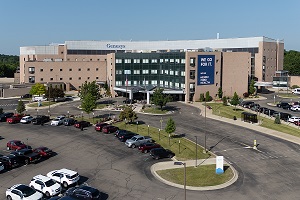Henry Ford Health System Posts Strong 2021 Financials Despite Ongoing Adversity

DETROIT (March 14, 2022) – Amid rising costs and other challenges within the economy at large and the healthcare industry, Henry Ford Health System posted a strong year for 2021 in terms of revenue and growth, with more patients choosing Henry Ford or returning for care in greater numbers, surpassing 2019 levels.
 “Healthcare has never been a more important lifeline in our communities, and we have been honored to serve a greater number of patients,” said Wright Lassiter, III, President and CEO, Henry Ford Health System. “The growth we’ve achieved is a powerful testament of both our communities’ trust in us and our unwavering commitment to our mission.”
“Healthcare has never been a more important lifeline in our communities, and we have been honored to serve a greater number of patients,” said Wright Lassiter, III, President and CEO, Henry Ford Health System. “The growth we’ve achieved is a powerful testament of both our communities’ trust in us and our unwavering commitment to our mission.”
That mission continues to come at a higher cost. Mounting economic pressures caused by increasing labor shortages, supply chain disruptions, inflation, and skyrocketing medical claims associated with COVID-19 continue to take a substantial toll.
The health system finished with a year-to-date operating loss of $168 million or -2.5% operating margin, thanks in large part, to approximately $135 million in delivery system expenses related to crisis and COVID-19 related costs and an additional $200 million related to medical claims including a $76 million premium deficiency reserve for 2022.
“Unfortunately, all of those factors caused significant increases in our expenses in 2021,” said Robin Damschroder, Henry Ford’s Executive Vice President and Chief Financial Officer. “In the end, those expenses and other operational challenges outpaced the revenue we achieved. Additionally, by the end of 2021, we had only recognized $13 million of the $111 million in reimbursable costs from FEMA for which we applied. Those funds are essential to helping health systems manage the pandemic.”
Henry Ford’s insurance company, Health Alliance Plan (HAP), had to consider many factors to estimate 2022 medical claims costs such as medical cost trends, provider rate inflation and the ongoing trajectory of the COVID-19 (pandemic or endemic) in 2022 to determine the level of premium deficiency reserve required.
“We have to assume that COVID’s impact to claims in 2022 will be similar to its 2021 impact,” said Dr. Michael Genord, President and CEO, HAP and Executive Vice President, Henry Ford Health System. “This conservative approach dictates that we set aside a premium deficiency reserve for each of our insured entities. A premium deficiency occurs when costs for a future period are expected to exceed related premiums. Accounting rules require us to add this reserve for 2022 to HAP’s 2021 financial statement, which appears as an additional loss.”
Strong investment returns of more than $200 million contributed to a total net income of $41 million (0.6%). The health system’s total liquidity remains strong with 182 days cash on hand which is down 24 days primarily due to the return of $124 million in accelerated Medicare payments.
Despite expectations that challenges will continue through 2022, Lassiter said the health system is optimistic about its outlook. “We understand and appreciate the headwinds we face. While there are many factors that continue to be outside our control, we are confident we can continue to lead our communities through this uniquely challenging time in our history.”
###
For media inquiries, contact Henry Ford Health System Media Relations at: mediarelations@hfhs.org.
.svg?iar=0&hash=F6049510E33E4E6D8196C26CCC0A64A4)

/hfh-logo-main--white.svg?iar=0&hash=ED491CBFADFB7670FAE94559C98D7798)





